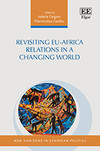Full text, catalogue, and publisher website
Publisher website:
 This chapter by Rahmane Idrissa has appeared in Revisiting EU-Africa relations in a changing world, edited by Valeria Fargion and Mamoudou Gazibo. The chapter argues that unequal pacts lead to sub-optimal outcomes for both the inferior and the superior party. The European Union's attempts to grapple with West African migration in ways that would prevent Europe-bound migration while protecting the human rights of migrant have failed. The paper argues that a significant cause for this outcome lies in the policy dynamics that stem from the unequal positions of the EU and its West African counterparts. The EU compromised the chances of a productive pact when its dominant position led it to try to control the policies of the West African parties and overlook local issues and regional dynamics. The latter played out in the responses of Mali, Nigeria and the Economic Community of West Africa States to the EU's strategy, which they hamstrung. Niger is shown to be an exception for reasons having to do with its role in those West African regional dynamics.
This chapter by Rahmane Idrissa has appeared in Revisiting EU-Africa relations in a changing world, edited by Valeria Fargion and Mamoudou Gazibo. The chapter argues that unequal pacts lead to sub-optimal outcomes for both the inferior and the superior party. The European Union's attempts to grapple with West African migration in ways that would prevent Europe-bound migration while protecting the human rights of migrant have failed. The paper argues that a significant cause for this outcome lies in the policy dynamics that stem from the unequal positions of the EU and its West African counterparts. The EU compromised the chances of a productive pact when its dominant position led it to try to control the policies of the West African parties and overlook local issues and regional dynamics. The latter played out in the responses of Mali, Nigeria and the Economic Community of West Africa States to the EU's strategy, which they hamstrung. Niger is shown to be an exception for reasons having to do with its role in those West African regional dynamics.
Rahmane Idrissa is a senior researcher at the ASCL. His research expertise ranges from issues of states, institutions and democratisation in Africa to Salafi radicalism in the Sahel and current projects on the history of state formation in Africa, with a focus both on the modern (Niger) and premodern eras (Songhay).

